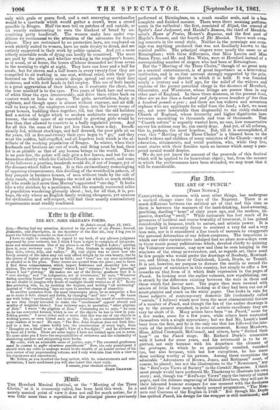Zusir.
Tax Hereford Musical Festival, or the " Meeting of the Three Choirs," as it is commonly called, has been held this week. In a merely musical point of view it does not call for much notice, for it was little more than a repetition of the principal pieces previously performed at Birmingham, on a much smaller scale, and is a less complete and finished manner. There were three morning perform. ances in the cathedral : the first, consisted of Elijah, the second of Spohr's Last Judgment, and Handers Samson, the third of Mendels- solm's Hyesa ?Praise, Mozart's Requiem, and the first part of Haydn's Seasons, and the fourth of The Messiah. There were even- ing concerts in the usual style. Neither in the mornings nor even- ings was anything produced that was not familiarly known to the musical public. The principal singers were nearly the same as at Birmingham; with these differences, that Miss Louisa and Miss Susan Pyne, and Mr. and Mrs. Weiss, were at Hereford instead of a corresponding number of singers who had been at Birmingham. But the "Meeting of the Three Choirs," though of no great note as a musical entertainment, is of great importance as a benevolent institution, and is on that account strongly supported by the prin- cipal people of the district in which it is held. It was founded nearly a century and a half ago, for the relief of the widows and orphans of the poorer parochial clergy in the dioceses of Hereford, Gloucester, and Worcester, whose livings are poorer than in any other part of England. In these three dioceses, at the present time, there are no less than a hundred and forty-seven benefices of less than a hundred pounds a year ; and there are ten widows and seventeen orphans who are applicants for relief from the fund; a fact, we must say, not more lamentable than disgraceful to the richly endowed Church of England, whose hierarchy and higher dignitaries have revenues amounting to thousands and tens of thousands. That " CCurch reform" is urgently wanted here, no one, how conservative soever his notions may be, can surely deny. And yet, of all reforms, this is, perhaps, the most hopeless. But, till it is accomplished, if
ever, "Meeting of the Three Choirs" is a blessed boon to the bereft widows and children of many ministers of the Church—men of education, attainments, and social position, who, while they live, must starve with their families upon an income which many a pam- pered menial would despise. We do not yet know the amount of the proceeds of this festival which will be applied to its benevolent object; but, from the manner in which the performances have been attended, we may trust that it will be considerable.






























 Previous page
Previous page